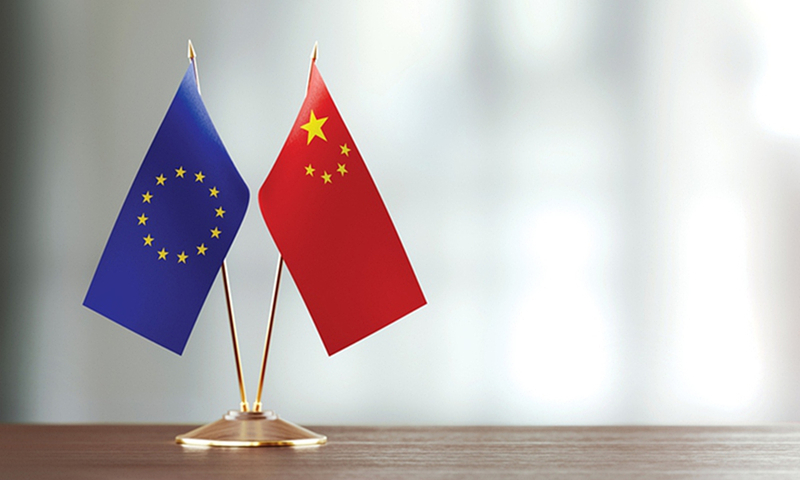Following Washington’s coercive move to ban new US investment in key technology industries in China, a number of European countries reportedly said they are weighing how to respond to the curbs.
Observers pointed out that it is unlikely that major European countries including France and Germany would meekly follow the US’ move to decouple, as imposing similar restrictions would inflict enormous damage on their tech industries and derail their development. Europe and China, the world’s second-largest economy, have booming, intertwined economic ties, and China is a major investor in Europe. Brussels needs to take into account the broader implications of a similar ban for China-Europe relations.
The repercussions of getting roped into the US ban would be “so catastrophic,” much more than the previous semiconductor export control on China – some of which was enacted under Washington’s pressure – that the EU economy cannot afford it, observers warned. They urged the European bloc to maintain diplomatic independency and mull a coordinated resistance against the US’ hegemonic actions.
In response to the US ban which US President Joe Biden signed on Wednesday US time, the European Commission said it was in “close contact” with the White House but it would not follow suit right away, the Financial Times reported. The EU instead indicated that it would make its own proposals by the end of the year.
The US ban bars new US investment in key technology industries in China that “could be used to bolster its military capabilities.” It prohibits US venture capital and private equity firms from investing in Chinese projects in semiconductors and other microelectronics, quantum computers and certain artificial intelligence applications.
Responding to Biden’s executive order, the German economy ministry said on Thursday that it would “actively participate” in the EU discussion about the approach that the continent should take, the Financial Times report said.
“The European bloc has its own reservations and considerations, because economic relations between China and Europe are more intertwined, and mutual investment in each other’s market is quite huge and mutually beneficial,” Ma Jihua, a Beijing-based senior industry analyst, told the Global Times on Friday.
Europe is obviously in a wait-and-see mode, as the starting point of its decision may be different from that of the US, Cui Hongjian, director of the Department of European Studies at the China Institute of International Studies, told the Global Times on Friday.
Bloomberg reported earlier that the US has briefed its G7 partners on the investment curbs, seeking to get their endorsement. But so far none of the US allies have followed up.
Europe will first assess whether this ban will have negative spillover effects on European development. It should take into account the overall pattern of existing investment between China and Europe and whether the decision will affect the relationship between China and Europe, as Europe has been a major source for investment in China, Cui stressed.
As of the end of 2022, total value of China-Europe two-way investment surpassed $230 billion. In 2022 alone, Europe’s investment in China soared 70 percent year-on-year to $12.1 billion, with vehicle industry becoming a hotspot. During the same period, Chinese investment in Europe grew 21 percent to $11.1 billion.
The European approach, at least, would not be as absolute as the US, according to analysts, as what they desire is the opposite of the US – to have greater access to Chinese markets, especially in some of the country’s new technology areas.
Ma said that Washington’s pressure to enact the ban has already faced strong pushback from Wall Street, and these calls to resist will be amplified in Europe if Brussels indicates it will act similarly. This is because the shockwaves would ripple across an array of high-tech industries, rather than the previous effect on the chip sector alone.
According to a Deutsche Welle report, German economic circles have reportedly expressed concerns over the US ban on China and are worried the EU may adopt similar regulations that would hinder economic growth.
As such, it is difficult for the EU to form a unified ban on investment in China in the short term, according to Cui.
The odds that the UK would align with the US ban are much larger than the EU bloc, analysts predicted, amid its murky relations with China.
In response to the US ban, a spokesperson for Prime Minister Rishi Sunak’s government said that “the UK will consider these new measures closely as we continue to assess potential national security risks attached to some investments,” Reuters reported.
“The UK may use the introduction of a similar investment ban on China as a bargaining chip to seek its own interests, such as obtaining investment from the US and engaging in free trade cooperation with the US,” Cui noted.
Analysts warned that as the US will surely step up pressure on the European side, it is important that Europe maintains an independent diplomatic and economic policy, and aims to strike a balanced position between China and the US out of its own interests.
(Global Times)




